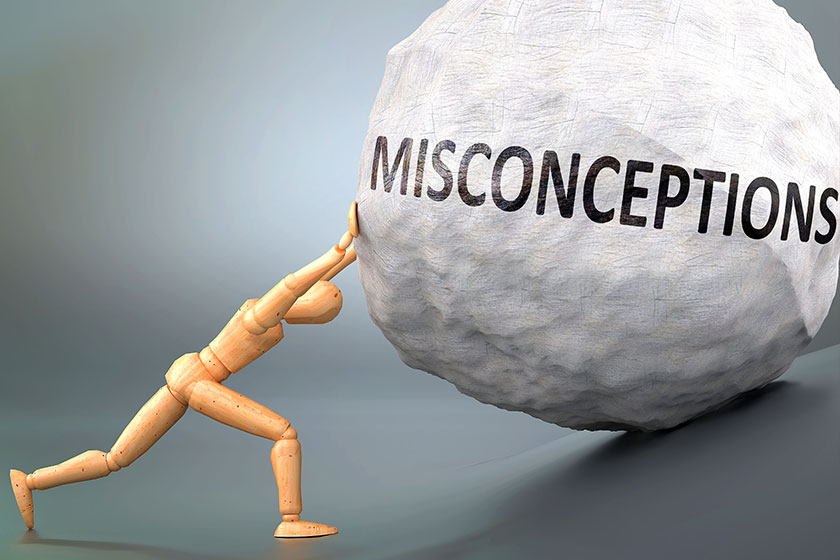Alzheimer’s disease is a debilitating and progressive brain disorder that affects millions of people worldwide. Despite extensive research on the condition, there are still many misconceptions about Alzheimer’s that continue to persist. Here are 10 misconceptions about Alzheimer’s disease you shouldn’t believe.
Memory Loss is Normal in Old Age
Memory loss is not a normal part of aging. While it is true that many older adults experience some decline in cognitive function, severe memory loss and confusion are not typical. Alzheimer’s disease is a progressive brain disorder that can cause significant memory loss, impaired judgment, and difficulty with daily activities.
Alzheimer’s Only Affects the Elderly
While Alzheimer’s disease is more common in older adults, it can affect people of all ages. In rare cases, early-onset Alzheimer’s can occur in people as young as their 30s or 40s. It’s essential to recognize the early signs of Alzheimer’s disease, no matter what age you are.
Alzheimer’s Disease is Caused by Aluminum
There is no evidence to suggest that aluminum causes Alzheimer’s disease. While aluminum was once thought to be a possible cause of the condition, extensive research has shown no significant link between the two.
There’s Nothing You Can Do to Prevent Alzheimer’s Disease
Although there is currently no treatment for Alzheimer’s disease, there are a number of lifestyle modifications you may implement to lower your chance of contracting the illness. Maintaining a healthy diet, staying physically active, managing stress, and getting enough sleep can all help to improve brain health and reduce the risk of cognitive decline.
Alzheimer’s Disease Only Affects Memory
Even though Alzheimer’s disease is known for its memory loss, the ailment can also lead to other cognitive issues. People with Alzheimer’s may have difficulty with language, problem-solving, decision-making, and other aspects of thinking. They may also experience changes in mood or behavior.
Alzheimer’s Disease is Inevitable
Alzheimer’s disease is not a given, despite the fact that age is a substantial risk factor. Diet and exercise are examples of lifestyle habits that might help lower the chance of getting the illness. Additionally, certain medical conditions, such as high blood pressure, diabetes, and high cholesterol, can increase the risk of cognitive decline, so managing these conditions is essential.
Only Family Members Can Care for Someone with Alzheimer’s Disease
Whilst also family members frequently take on a large portion of the caregiving for a person with Alzheimer’s disease, they are not the only people who can help. Professional caregivers, such as nurses or aides, can provide essential services to people with Alzheimer’s disease, such as medication management, bathing, and other personal care.
Alzheimer’s Disease is a Normal Part of Aging
Although Alzheimer’s disease is increasingly prevalent among older persons, it is not a typical aspect of aging. It is a degenerative brain ailment that can cause serious cognitive deterioration and ultimately result in death. Recognizing the early signs of Alzheimer’s disease and seeking medical attention can help to manage the condition and improve quality of life.
Alzheimer’s Disease is Just Memory Loss
The defining sign of Alzheimer’s disease is memory loss, however, the disorder can also produce other symptoms including changes in mood or behavior. People with Alzheimer’s may become irritable, agitated, or depressed. They may also have trouble sleeping or experience hallucinations or delusions.
Alzheimer’s Disease is Always Inherited
Though Alzheimer’s disease has a hereditary component, it is not usually inherited. Alzheimer’s disease typically develops incidentally and has no known hereditary basis. However, some families have a higher risk of developing the condition due to genetic mutations. Genetic testing can help to determine the risk of developing Alzheimer’s disease in these cases.
In conclusion, there are many misconceptions about Alzheimer’s disease that continue to persist. It’s important to dispel these myths so that people can better understand the condition and how to manage it. By recognizing the early signs of Alzheimer’s disease and seeking medical attention, people can receive the care they need to manage the condition and improve their quality of life. Additionally, by making lifestyle changes such as maintaining a healthy diet, staying physically active, and managing chronic medical conditions, people can reduce their risk of developing Alzheimer’s disease. It’s essential to educate yourself about Alzheimer’s disease and spread awareness to help improve the lives of those affected by the condition.






